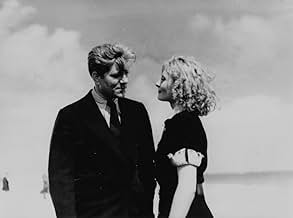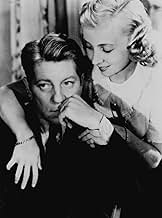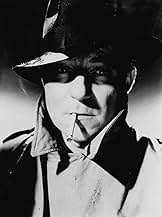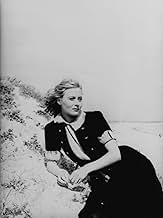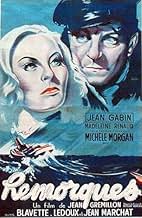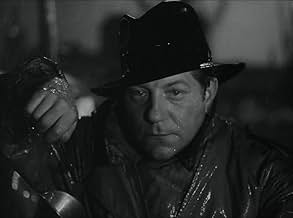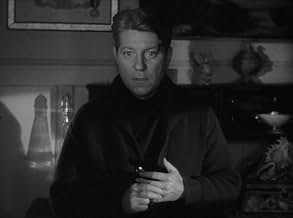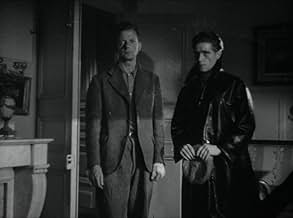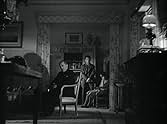Remorques
- 1941
- Tous publics
- 1h 31m
IMDb RATING
7.2/10
1.7K
YOUR RATING
The captain of the tugboat Cyclone, André Laurent, rushes off to save the Mirva. He abandons his sick wife Yvonne and the couple celebrating their marriage. In the early morning, the Cyclone... Read allThe captain of the tugboat Cyclone, André Laurent, rushes off to save the Mirva. He abandons his sick wife Yvonne and the couple celebrating their marriage. In the early morning, the Cyclone tugs the Mirva ashore with Catherine aboard.The captain of the tugboat Cyclone, André Laurent, rushes off to save the Mirva. He abandons his sick wife Yvonne and the couple celebrating their marriage. In the early morning, the Cyclone tugs the Mirva ashore with Catherine aboard.
Madeleine Renaud
- Yvonne Laurent
- (as Madeleine Renaud de la Comédie Francaise)
Charles Blavette
- Gabriel Tanguy
- (as Blavette)
Jean Dasté
- Le radio
- (as Jean Daste)
René Bergeron
- Georges
- (as Bergeron)
Henri Poupon
- Le docteur Maulette
- (as Poupon)
Marcel Pérès
- Le Meur
- (as Perez)
Marcel Duhamel
- Pierre Poubennec
- (as Duhamel)
Henri Pons
- Roger
- (as Pons)
Léonce Corne
- Un invité à la noce
- (uncredited)
Lucien Coëdel
- Un marin du 'Cyclope'
- (uncredited)
Henri Crémieux
- L'administrateur
- (uncredited)
Featured reviews
A simple story. at first sigh, too simple. because it could seems be well known. but not the love story is the axis. but the atmosphere. the performances. the ocean. the mixture of duty, romance and clash against reality. the strange beauty of the meet between Morgan and Gabin after "Quai des brues"). and, sure, the moving end. a film who remains bitter -seductive against the decades. for its remarkable simplicity. for admirable performances. and for reasons escaping to precise definition.
Jean Gabin stars as the captain of a tugboat. On a job, he rescues Michele Morgan. Later, they begin a romance, though Gabin is married to the lovable but perpetually worried Madeleine Renaud. This is a pretty good film, though it has some major flaws. The scenes in the stormy seas (which is what the title literally means) look particularly great for the time. The major flaw, as I see it, is that the relationship between Morgan and Gabin just happens too quickly, and is thus not that believable. In the scenes between Gabin and Renaud, their relationship seems so wonderful and loving that it's hard to believe he'd dump her so quickly - like later the same day, pretty much. The film's finale is quite powerful. The performances throughout are excellent, especially Gabin's. Jacques Prevert co-wrote the script.
Andre Laurent, the captain of a tugboat, married Yvonne ten years ago. She has a heart disease but does not want to tell him. She dreams he quits his job so they can live quietly. One night, during a sea rescue, he meets Catherine. She wants to leave her husband, the captain of the rescued ship.
Jean Grémillon (1901-1959) seems to be a director who knows what he wants. He started this film as the war began (or just prior), and despite France being taken over by Germany, and having to reshoot some footage, he kept at it. And what we get is actually a really good movie. Sometimes I think Criterion releases their eclipse sets just to make a point of saying France, Japan, etc still had movies during World War II, and is not necessarily concerned about how influential or important they may be.
This one looks beautiful and surely had an impact. It reminds me of the sort of cinematography we got from the val Lewton-produced films.
Jean Grémillon (1901-1959) seems to be a director who knows what he wants. He started this film as the war began (or just prior), and despite France being taken over by Germany, and having to reshoot some footage, he kept at it. And what we get is actually a really good movie. Sometimes I think Criterion releases their eclipse sets just to make a point of saying France, Japan, etc still had movies during World War II, and is not necessarily concerned about how influential or important they may be.
This one looks beautiful and surely had an impact. It reminds me of the sort of cinematography we got from the val Lewton-produced films.
No denying the magnificent, moody visuals are done with mastery. Gabin and Morgan are commanding in their roles as always. Supporting cast similarly excellent. Makes it clear from the beginning that it's a moody film, unlikely to end in the bright light of castles. And carries through that tone with grace. Human emotions often cause melodrama and tragedy. Sometimes, all we can do is carry on with what we know best. We had a nice detour; we make our decisions in life, though, and sometimes that's that. It was fun to live in fantasy for a while, but real life snapped us back and it's back to the grind. Poetic realism defined.
Title: An always vexing choice, "Stormy Waters" is the altered title chosen, rather than the original French "Remorques", which refers to the boat tuggers or trailers used for sea rescues, such as protagonist Captain André's "Cyclone".
Title: An always vexing choice, "Stormy Waters" is the altered title chosen, rather than the original French "Remorques", which refers to the boat tuggers or trailers used for sea rescues, such as protagonist Captain André's "Cyclone".
Seas cover seven tenths of the terrestrial globe and have inspired painters, writers, composers and not a few film-makers and this adaptation of a novel by Roger Vercel is one of the very best of its type.
Considered by the French to be among their most gifted directors, Jean Grémillon is fated to be little known abroad except to a coterie of cinéphiles. He had envisioned a far more realistic storm sequence to be filmed in Brittany but this was deemed impracticable for health and safety reasons and he was obliged to shoot in UFA's studios at Billancourt. Nonetheless this sequence still comes off pretty well. Filming came to a grinding halt with the outbreak of war and it was not completed and released until 1941 by which time its two stars had gone to Hollywoodland.
Navigating the stormy waters of desire are Jean Gabin and Michéle Morgan, one of Cinema's most memorable couples. On-screen chemistry is hard to define but their deep fondness for each other off-screen is evident whilst her ethereal quality is perfectly allied to his earthiness. As his wife is Madeleine Renaud who was later to star in Grémillon's excellent but underrated 'Le Ciel est a vous'. Renowned as a stage actress her sporadic appearances in film represent quality over quantity. Fernand Ledoux makes the most of a thankless role and if you blink you'll miss an uncredited Alain Cuny.
Stunning cinematography by one of his nation's finest, Armand Thirard, powerful score by Roland-Manuel whilst at the insistence of Grémillon and Gabin, the screenplay has been entrusted to Jacques Prévert whose poetic/realist style is perfectly suited to this tale of doomed love and the forces of Nature.
Grémillon's ambitious projects were constantly thwarted by the constraints of commercial cinema but his comparatively small output is a legacy to be treasured.
Considered by the French to be among their most gifted directors, Jean Grémillon is fated to be little known abroad except to a coterie of cinéphiles. He had envisioned a far more realistic storm sequence to be filmed in Brittany but this was deemed impracticable for health and safety reasons and he was obliged to shoot in UFA's studios at Billancourt. Nonetheless this sequence still comes off pretty well. Filming came to a grinding halt with the outbreak of war and it was not completed and released until 1941 by which time its two stars had gone to Hollywoodland.
Navigating the stormy waters of desire are Jean Gabin and Michéle Morgan, one of Cinema's most memorable couples. On-screen chemistry is hard to define but their deep fondness for each other off-screen is evident whilst her ethereal quality is perfectly allied to his earthiness. As his wife is Madeleine Renaud who was later to star in Grémillon's excellent but underrated 'Le Ciel est a vous'. Renowned as a stage actress her sporadic appearances in film represent quality over quantity. Fernand Ledoux makes the most of a thankless role and if you blink you'll miss an uncredited Alain Cuny.
Stunning cinematography by one of his nation's finest, Armand Thirard, powerful score by Roland-Manuel whilst at the insistence of Grémillon and Gabin, the screenplay has been entrusted to Jacques Prévert whose poetic/realist style is perfectly suited to this tale of doomed love and the forces of Nature.
Grémillon's ambitious projects were constantly thwarted by the constraints of commercial cinema but his comparatively small output is a legacy to be treasured.
Did you know
- TriviaThe film's production was heavily disrupted by the Second World War. Filming started in July 1939 but was interrupted on 3 September due to France declaring war on Germany, with director Jean Grémillon and lead actor Jean Gabin being mobilized. With a special permission granted, shooting resumed on 6 May 1940 but was interrupted again in June with the German army at the gates of Paris, leading producer Joseph Lucachevitch to flee to the USA while assistant director Louis Daquin and editor Marcel Cravenne took the film reels to the south of France, in Marseille and Pau. Filming resumed for the final time under German occupation in 1941, despite both lead actors Jean Gabin and Michèle Morgan having fled to the USA and concluded on 2 September, with some planned scenes having never been shot.
- ConnectionsEdited into Spisok korabley (2008)
- How long is Stormy Waters?Powered by Alexa
Details
- Release date
- Country of origin
- Official site
- Language
- Also known as
- Stormy Waters
- Filming locations
- Production companies
- See more company credits at IMDbPro
- Runtime
- 1h 31m(91 min)
- Color
- Aspect ratio
- 1.37 : 1
Contribute to this page
Suggest an edit or add missing content

